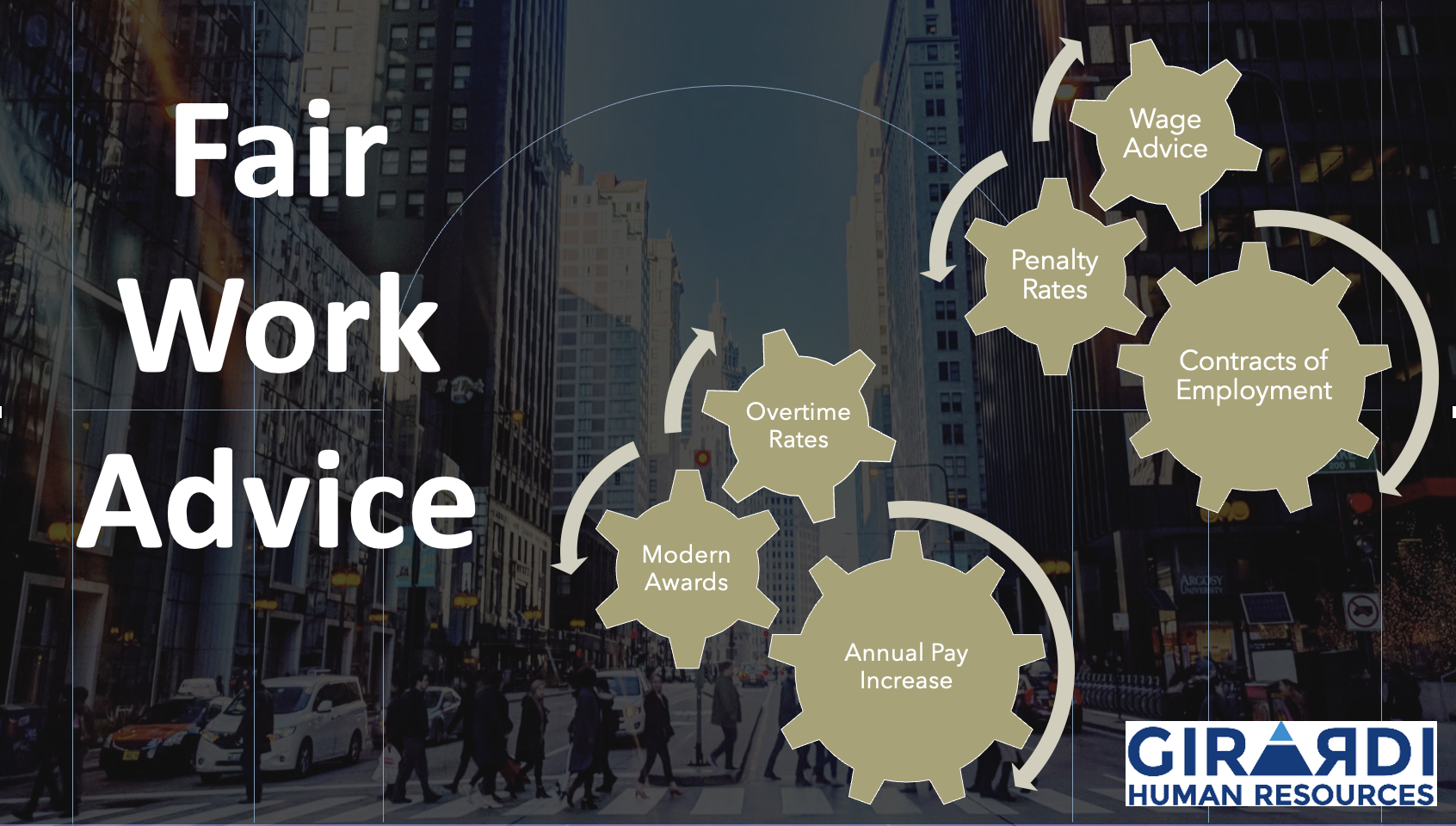
21 Jul Fair Work Advice for Employers
It’s important that all employers know: 1. Which Award applies to their employees; 2. How to classify their employees correctly; 3. What pay rates apply; and 4. When penalty rates apply.
Girardi Human Resources has more than 25 years’ experience assisting employers with this advice. To book in for a consultation, phone: 0421 085 546 or email us for a quote: info@girardi.com.au
What you need to know
What Award applies?
About 12 years ago, there was an Award modernisation process which resulted in a massive reduction in the number of Awards in Australia. This was a welcome change, as it simplified what had previously been a very complex Award system. However, despite these changes, there are still more than 120 modern Awards in Australia and it’s important to know which one applies to your employees. Why? Because although there are a lot of similarities between the Awards, there is also a lot of variability, such as with pay rates, penalty rates, and allowances.
How do you classify your employees correctly?
All Awards have a classification section and most Awards require that you notify your employees (in writing) of the classification that applies to them. If you don’t know what classification applies to your employees, how can you possibly know what their correct pay rate is?
What pay rate applies to your employees?
Once you know the correct Award and classification level for each employee, you can then work out what pay rate applies to each of them. There are base pay rates and penalty pay rates (such as for overtime and weekend work) and it’s important to know when these apply.
Minimum Award pay rates are adjusted and increases normally apply from the first full pay period in July each year. You need to make sure that you review your pay rates (in time for July 1) every year to ensure that you are not underpaying your employees.
Are your employees casual or permanent?
There’s a big difference between permanent and casual employment. Casual employees receive a casual loading (generally 25%, but it’s dependent on the Award that applies). Casual employees don’t receive paid leave entitlements (annual leave, personal leave) and are not paid for public holidays.
However, casual employees who have worked on a regular and systematic basis for more than 12 months now have a right to permanency. You need to understand your obligations as an employer in relation to when you need to convert a casual employee to permanent employment.
For permanent employees, it’s important to understand the concept of Ordinary Hours. In employment law, the term Ordinary Hours refers to the contracted hours that an employer and employee have agreed on. In many businesses, the work hours of part-time employees can vary week to week. There are risks associated with doing this that you need to be aware of and that you should be managing, which you can read about here.
Why do I need employment contracts?
A lot of small to medium sized businesses don’t have written employment contracts in place. Employment contracts are like insurance. We see a lot of common employee problems that businesses encounter and we know from dealing with a wide variety of employers (some that have had no written contracts in place, or poor contracts in place), it is far easier to deal with many of these problems if you have good, basic employment contracts in place. Here’s 10 reasons why you should have written employment contracts for your employees.
How do I get all of this right?
It doesn’t take much to get all of this right. If Human Resources and Fair Work issues are not your area of expertise and you don’t employ a Human Resource expert, how can you possibly keep on top of all this? Outsourced Human Resource support can save you a lot of time and money. We have packages to suit different sized employers and we tailor our services to our clients.
One option is to purchase a package of contract templates and obtain confidential advice on pay rates for your employees. That’s peace of mind and insurance against the myriad of HR problems a business can encounter. Another option is for ongoing HR support.
To book in for a free consultation, phone: 0421 085 546 or email us for a quote: info@girardi.com.au
You can read more about my services and my approach to implementing a HR system here.


No Comments